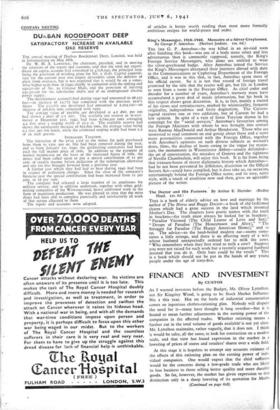THE late G. P. Antrobus—he was killed in an air-raid
soon after finishing this book—was one of a body more select and less adventurous than is commonly supposed, namely, the King's Foreign Service Messengers, who alone are entitled to wear the silver-greyhound badge. After Antrobus joined the Service the King's Messengers alternated their journeys abroad with duty in the Communications or Cyphering Department of the Foreign Office, and it was in this that, in fact, Antrobus spent most of his official career. So it is not that record of foreign travel promised by the title that the reader will get, but life in London as seen from a room in the Foreign Office. As chief coder and decoder for a number of years, Antrobus's memory must have accumulated a great deal of inside information, but his book in this respect shows great discretion. It is, in fact, mainly a record of his views and reminiscences, marked by whimsicality, frequent originality, independence and lively dogmatism. The Curzon- legend receives one or two additions, but of Curzon he had a low opinion. In spite of a vein of fierce Toryism shown in his contempt for the " social services," Antrobus's favourites among the Foreign Ministers with whom he was brought into contact were Ramsay MacDonald and Arthur Henderson. Those who are interested to read comment on and gossip about these and a score more personalities connected with the Foreign Office, together with Antrobus's opinions on such diverse subjects as women's dress, films, the decline of boots owing to the vogue for motor- cars, the monuments in Westminster Abbey—stoutly defended— the art of conversation, the mistakes of Geneva and the rightness of Neville Chamberlain, will enjoy this book. It is far from being that treasure-house of recent diplomatic history which Antrobus- had he not been prevented by diffidence, discretion or the Official Secrets Act—could have compiled, but it does take us, on occasion, entertainingly behind the Foreign Office scene, and its easy, naive style, with -a touch of erudition now and then, gives an agreeable picture of the writer.


























 Previous page
Previous page